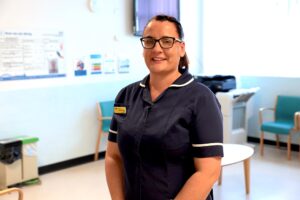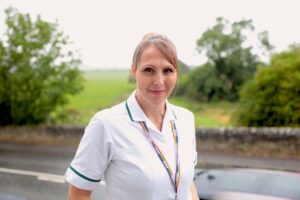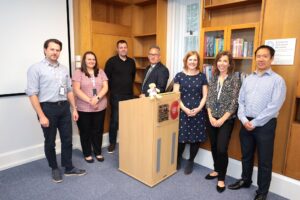This year’s Winner was the Trust’s Simulation Team. Congratulations!
We had three NMAHPs Finalists for this award:
Joanne Campbell

Overseeing the pre-assessment endoscopy team, Joanne witnessed first hand the pressure the pandemic placed on an increasing waiting list, meaning nursing resource was unable to cope with the patients needing to be pre-assessed.
To support colleagues, she sourced and met with a company called Health Call, who specialise in digital assessment questionnaires, to come up with a solution for the service which was trialled from July to November 2022.
Of 405 patients who required a diagnostic gastroscopy, 300 completed the questionnaire with 59 identified as high risk and needing a further call from the pre-assessment team. This meant 80% did not require a further assessment saving 100 hours of nursing hours.
Introducing this simple digital technology now means all patients who require an endoscopy receive a pre-assessment but as the team scope 16,500 patients every year – 6,500 of which are diagnostic – the future plan is to roll this out to all diagnostic patients with an estimated saving of £15,900 and 600 nursing hours.
Deborah Webster

Deborah took up her new role as advanced occupational therapist in October 2022, taking the lead on looking at a range of pre and postoperative pathways, carrying out assessments and implementing interventions for patients waiting for foot or ankle surgery who need to remain non-weight bearing for several weeks post operatively.
Before taking up post, pilot studies had been carried out in an ad-hoc manner with some positive results in enabling some daycase surgery and shortening the length of stay for non-weight bearing elective foot and ankle patients.
Deborah developed, standardised and increased capacity in these pathways with:
- 18 Day Treatment Centre foot patients assessment 10 operated on
- 34 daycase patients and 18 operated on
- 50 inpatients pre-assessed and 42 operated on
Previously patients were only pre-assessed in exceptional circumstances when a need was identified by the surgeon or a specialist nurse but, because of Deborah’s work, many patients have been confirmed appropriate for daycase surgery rather than an inpatient stay, and for those who were admitted, their stay reduced.
Patients also reported they felt better prepared for surgery and reassured how they would manage once home – a testament to Deborah.
aHUS Specialist Nurses

Treatment for aHUS – an ultra rare disease affecting the kidneys – is shared between local kidney teams and the National aHUS Service in Newcastle, and our specialist nurses care for patients across England and Scotland.
If aHUS is the suspected diagnosis, the service recommends and authorises the use of a high cost treatment called eculizumab but for some patients at end stage renal failure and on dialysis needing a kidney transplant – treatment is futile.
The service can pre-approve this patient group to be started on eculizumab to protect the newly transplanted kidney from being affected by aHUS but as patients need to have their first dose just before the new kidney is implanted, hospitals have been reluctant to hold this extremely expensive drug on a ‘just in case’ basis as it may expire.
The aHUS specialist nurses looked for an alternative solution and spoke to transplant centre pharmacists about workable options before approaching the drug manufacturer.
They agreed to swapping out the drug stock near expiry or replacing it free of charge, as well as a controlled process allowing a transplant pharmacy to hold stock for a named patient – ready for immediate use.
This arrangement is now being relayed across the country and, more importantly, safeguards patients by ensuring there is a mechanism in place to guarantee the drug is available for them at the time of transplant.